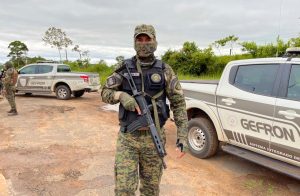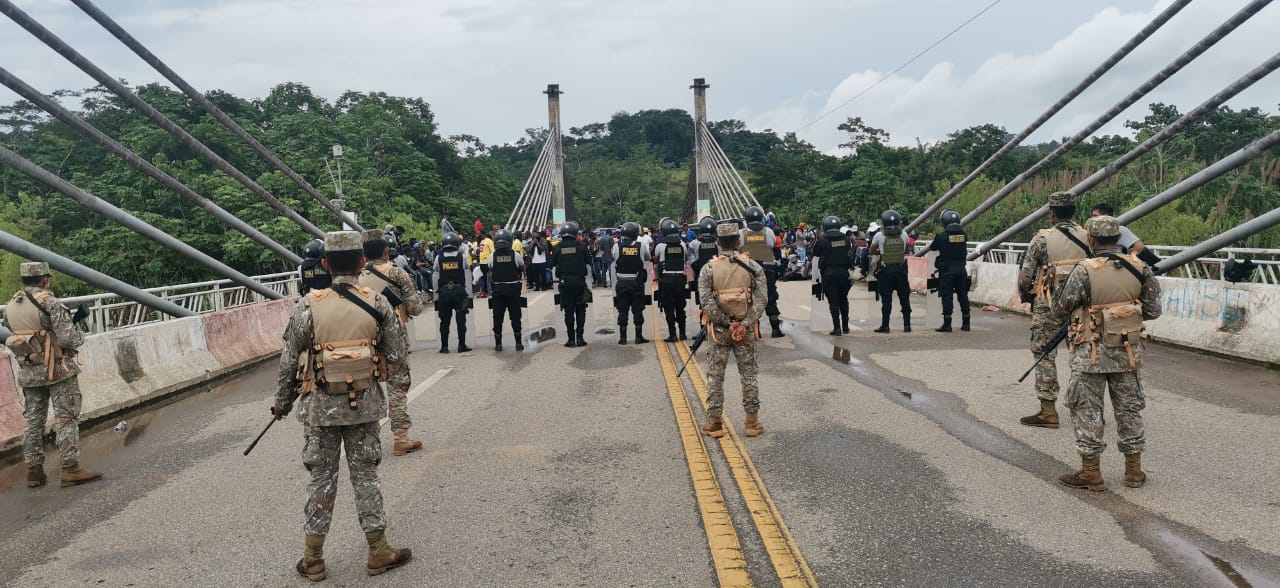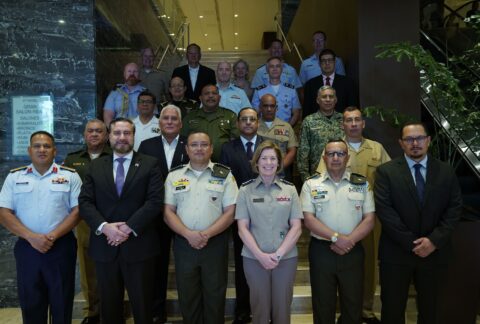Acre, one of the Brazilian states located in the Amazon region, counts with the support of a Special Border Group (GEFRON, in Portuguese) since September 2019. Neighbor to Bolivia and Peru, the state struggles to combat drug and arms trafficking throughout its extensive border region. Acre Military Police Colonel Antônio Teles de Almeida, GEFRON coordinator, spoke with Diálogo about his team’s work and the main results of their operations.
Diálogo: GEFRON recorded a 38 percent increase in seizures along Acre’s borders with Bolivia and Peru compared to the first quarter of 2020. What factors have influenced that increase?
Acre Military Police Colonel Antônio Teles de Almeida, GEFRON coordinator: GEFRON was created in September 2019. In December 2020, I assumed command and began to integrate field operations together with the teams, in addition to counting on intelligence work carried out by the intelligence agency of the Acre State Secretariat of Justice and Public Security. The results for the first quarter of 2021 are due to increased police checkpoints and operations, generated by intelligence services. Our presence at the border has expanded, which brought better results.
Diálogo: What is the financial impact of GEFRON’s seizures?
Col. Teles: Since the beginning of these activities, between September 2019 and March 2021, we seized the equivalent of more than $2.5 million. This is a calculation of the value of seizures of weapons, vehicles, drugs, boats, and smuggled goods. As of the first quarter of 2021, by April, we had already seized 250 kilograms of cocaine.

Diálogo: What are the main items seized in this region?
Col. Teles: The Acre border is largely a dry border. Organized crime steals a lot of trucks in the region, especially in the rural area near the border. These trucks serve as a bargaining chip for the purchase of cocaine and weapons. As a result, we end up seizing many of those vehicles. However, we mostly seize drugs and substances used as raw material for cocaine, such as hydrochloride. In short, the main items are vehicles, cocaine, cigarettes, and weapons.
Diálogo: What led to the creation of GEFRON?
Col. Teles: Acre is on a drug trafficking route. We have borders with Bolivia and Peru. Cruzeiro do Sul [an Acre municipality] is at the heart of this situation because it shares borders with the city of Pucallpa, Peru. The largest coca plantation in the country is in the Pucallpa Valley. This drug enter through the rivers and heads toward Rio Branco [capital of the state of Acre]. In addition, drugs coming from Colombia enter Brazil through the Amazon River Basin. Therefore, the current governor decided to create GEFRON as part of a modified policing strategy, focused on patrols, since the border was unguarded.
Diálogo: Acre has an extensive border with Bolivia and Peru, located in the middle of the Amazon jungle. What are the challenges of operating in a border area with these characteristics?
Col. Teles: One of the greatest challenges is efficient communication, because when you move away from the city you lose your internet connection. At times, we carry out an operation without any access to our databases, therefore we are unable to conduct a background check to verify whether the vehicle or the person in question has an outstanding warrant.
Diálogo: How does GEFRON operate? What are your main activities?
Col. Teles: Our maneuvers have fixed and dynamic roadblocks, specific approaches and operations, including integrated operations with the Brazilian Army. We also operate with the Federal Highway Patrol, Federal Police, and Civil Police. GEFRON works with other agencies to carry out its border policing function with a focus on transborder crimes.
In addition to the roadblocks, we use ATVs to patrol locations where conventional trucks are unable to enter, especially during the rainy season in the Amazon region, and we operate with motorcycles and conduct riverine policing, patrols with boats. We also report directly to the Secretary of Public Security, who deploys us when there is a need to provide support to police battalions.
Diálogo: Who makes up GEFRON and how many elements are currently part of the group?
Col. Teles: GEFRON brings together the best officers from the Military Police, Civil Police, Acre Military Firefighters, and the judicial police. Currently, we are an expanding group with 34 professionals. In June, there will be a training course, based here in the state, for the admission of new members to the group.
In addition, a base is being created 25 kilometers from Rio Branco, where our vehicles, lodging, and weapons reserves will be — a barracks of sorts for GEFRON. On April 28, an agreement was signed with the city of Epitaciolândia [border with Bolivia], for the construction of a GEFRON base in this city, with scheduled construction for yet another base in the city of Cruzeiro do Sul. The equipment required for our operations will be stored at these locations.









